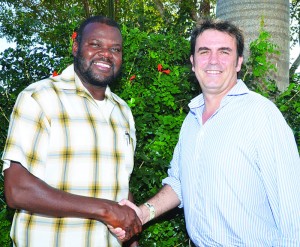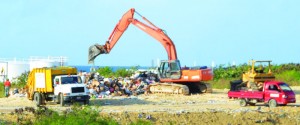

Anguilla is slated to be the first Caribbean island where a solid waste dumpsite is to be used to generate electricity once plans augur well towards that end. The Corito waste energy project is under consideration by Government and the Anguilla Electricity Company (ANGLEC). The developers are from Global Green Energy of the Americas, whose Chief Operations Officer, Mr Richard Pullen, is now in Anguilla from his base in Cambodia continuing talks to get the project up and running.
Mr Pullen and Anguilla’s Minister of Infrastructure, Mr Evan Gumbs, visited The Anguillian on Tuesday, February 4, for an interview. “The project is a hundred percent our investment; it is a hundred percent our risk so there is no grant, no subsidies, no cost to ANGLEC, the Government, the residents, and there is no tax money. This is a hundred percent our investment,” Mr Pullen emphasised.
To this, Mr Gumbs, noting that the Government is a major shareholder of ANGLEC commented: “In comparison to solar energy, which I support, this project is much better than solar. For one megawatt, solar energy, will cost us five million dollars. That is going to take five acres of land and we need about twenty megawatts so you know how much land we are talking – and how much money we are talking as well. Being that this [waste energy project] is not a cost to Government or Anguilla, it has my full support.”
Mr Pullen gave The Anguillian some of the details of the project. “We are Waste to Energy Experts and our proposal is to take the waste that is generated on the island and process it into electricity for ANGLEC,” he said.
“The technology inventor is Japanese and it is manufactured in South Korea. We specialise in projects within those countries, Australia and South-east Asia. This will be our first project in the Caribbean, and we are looking to branch out from here [Anguilla] throughout the Caribbean. We started marketing this technology only two years ago. We have been manufacturing, making and operating it for over fifteen year so it is proven technology, but it will be the first time over this part of the hemisphere.”
Mr Pullen was asked whether there was a particular reason for selecting Anguilla for the pilot project in the Caribbean.
“It was by chance,” he replied. “We were invited to tender at the Dutch side of St Maarten last year. We looked at that, first of all, because it is a much bigger project – ten times the size here. It was through that that we started in Anguilla. One of the people we were dealing with introduced us to Mr Evan Gumbs. We started talking and progressed from there. We decided that this one in Anguilla is a much better project for us…At the same time, when we were putting in our proposal and were short-listed in St Maarten there were some changes within the Government there; and for a company like ours it would have been a single investment of over 200 US million dollars. We decided that it’s probably not the right time and we decided to concentrate on Anguilla instead of St Maarten.”
Questioned further, Mr Pullen continued: “We are looking at a total phased investment exceeding twenty million US dollars in Anguilla. In the first phase, we will take all the waste that is generated on the island everyday and process it. Our second phase, which is really about a year afterwards, will depend on how the first project worked, how happy our customer, ANGLEC, is – and how the Government wants us to progress. We will then start reclaiming the land at Corito and begin mining the waste sitting there. We will dig that out and process that as well. We will put in two modular plants working side by side within the same facility.”
The Anguillian asked Mr Pullen what types of waste materials were usable for the purposes of his firm’s generation of electricity.
“We will take all the waste that is combustible,” he replied. “The only things we cannot process are non-combustible materials which are metal, glass and ceramics. Anything else we want – car tyres, plastics, organics – all the combustible items we will process.”
What will ultimately happen in the case of the non-combustible materials at the Corito site, Mr Pullen was questioned.
“At the moment, we are looking at many other options,” he said. ‘We are an engineering company so therefore we can compact them down to make it possible for shipment elsewhere that we might wish to do; and we are talking to some local contractors as well. We will process all the combustible waste. What we don’t process, we will look at other options but it is not our core competence and it is not our core business.”
Mr Pullen explained the process required to create electricity from waste.
“The process that we have is patented prorolysis,” he stated. “The best way of describing this is that we are all aware how natural gas and fossil fuel comes from the earth. It is organic matter that is combusted under extreme pressure and extreme temperature. Prorolysis is doing that at a very high speed. We break down the waste into a uniform size. We then put it through a system which is under extreme pressure and extreme heat with very, very little oxygen so it is not burning…What takes 200 million years in natural history, will take us an hour maybe.” According to him, the varied stages of processing will eventually produce the synthetic gas or fuel that creates electricity.
Mr Pullen said that once the Government approves his company’s proposal it could take six to eight months to be fully operational. “We will have to build our equipment, ship it to Anguilla, install it and commission it,” he explained.
Questioned about any possible effects on the environment, he responded:
“We just had an Environment Impact Assessment performed which will be submitted to the Government and the pubic probably next week. We looked at all the issues – whether noise, air pollution, odour or anything else. We obviously take environment safety very seriously and will make sure that with what we are doing there is no negative impact. We have had some emissions [elsewhere] but they are way below the international standards. The location we are in is Corito and there are residents close by. We are very mindful of that so we have to change our system to fit the environment that we are going to be working in.”
Minister Evan Gumbs was asked about the Government’s response to the proposed project.
“Government has given the green light to GGE, but it is all waiting on the Environmental Impact Assessment Study that holds the key,” he commented. “Once it is good, we will not have a problem with the project. It is going to be a plus for us. As you know, we have that disease from the mosquito going around. I am not saying that we will be able to get rid of the mosquitoes completely, but we will get rid of the tyres that harbour water and breed mosquitoes so that will be a plus for us. We will also be getting the flies under control because the company is going to house the garbage; and we are going to reclaim the landfill site and will have that land back.
“It all is going to be a plus for Anguilla, but the most important part will be a reduction in electricity cost. That was one of my campaign promises so I am very happy about that, and I am very pleased that we are moving speedily ahead. I know quite a few people said I campaigned on cheaper electricity and it hasn’t happened. But nothing happens before its time and we just can’t rush into doing things the wrong way and then look stupid. I think the project will be a plus for Anguilla on a whole. It is going to create a few jobs so I don’t see anything negative about it. It is not going to be an incinerator form of project and so there will not be any burning or smoke. If we are going to get rid of our garbage in the form to be provided by the project, and we are going to get electricity, it will be good for us.”








